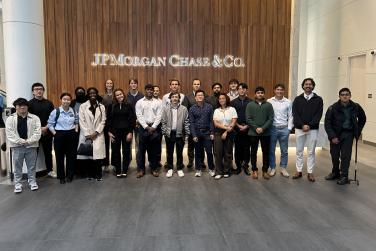
What to Expect in your Pre-Term Training for SMF?
When I entered the SMF program and heard there was an intensive 2-week preterm financial basics training course, I really had no clue what to expect. All I really knew was the course name, Financial Analysis and Valuation, and when to be on zoom the first day. That’s why I thought for my very first blog post it would be a good idea to shed some light on this course.
Course Content
This course was designed to bring all students, whether they had a finance background or not, up to speed on fundamental techniques for financial analysis and valuation. This means that while pre-existing finance and business knowledge may be helpful, it is in no way necessary to succeed in this course. You can expect to build solid foundational knowledge in areas like risk and return, estimation of a firm’s cost of capital, project analysis, financial statement analysis, Discounted Cash Flow Models, and Relative Valuation.
As a finance major during my undergraduate studies most of these concepts were already familiar to me, but I still managed to learn so many new things during the pre-term course. Most importantly though it reinforced my understanding of these concepts, so I was able to utilize the knowledge I picked up when the actual semester kicked off.
Course Delivery
Due to the ongoing pandemic, the first week of the course for my cohort was online. Each of those days was typically split into two hour and half sessions, each of which focused on a different topic. In between those sessions we would be given around 30-minute break to give our brain some rest and grab some lunch. Typically, I am not a huge fan of online class, but I have to give props to Professor Pinteris, who ran the course, for keeping even the online course very stimulating. He did a great job making sure everyone had their cameras on and was actively participating in class discussions.
After that first week though it was time to go back to class in person. This was exciting for me, as it was first in person class in over a year due to the pandemic. In person class was very similar to the online in the terms of format, but it was nice to get the chance to meet and interact with the other members of my cohort face to face.
Student Work
Through the duration of the course, students can expect to complete a mix of individual and collaborative assignments. With the individual assignments, you get the chance to display your personal knowledge, but the real focus is on the team assignments. A big part of the SMF experience is learning to succeed in a team environment, and that starts all the way from the training course. Much of the coursework will force you to have stimulating discussions with your fellow classmates. I really liked this, and I feel like by the end I had learned almost as much from my peers as I had in lectures.
My favorite part of the coursework was the case discussions. During my undergraduate studies, I saw case discussions as tedious more than anything, but during this course I gained a real appreciation for them. They forced me to develop the critical thinking skills that are so important in finance, but the real reason I liked them was simply because they were engaging. When everyone is coming in with different ideas, it is fun to just listen to and maybe even debate these ideas.
My Three Tips for Success
Now that you hopefully know a little bit more about what to expect, I wanted to leave you with some tips that can help you succeed if you do find yourself in my shoes in the future.
-
Come ready to invest yourself in the course: the old saying “you only get out, what you put in” certainly holds true when it comes to this course. If you dedicate time and effort to this course, it will pay dividends both during the course and in the future.
-
Connect with your classmates: one of the biggest strengths of the SMF program is the diversity in the cohort, so don’t be afraid to talk to everyone. They can help you out in the course and they might just be your best friends for the next year.
-
Don’t be afraid to ask questions: this course was designed for both non-finance and finance students, so if you have questions about a concept, it is likely someone else has the same one. Asking good questions helps both you and your classmates, so don’t hold back.







